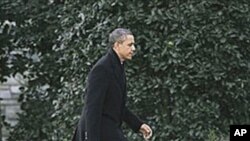A long-simmering battle over U.S. government spending will intensify Monday when President Obama unveils a $3.5-trillion proposed federal budget for the next fiscal year, which begins in October.
The president’s budget blueprint, and Republican reaction to it, will highlight a major divide in American politics between those who view government as a necessary promoter of progress and the common good, and those who see it as a burdensome impediment to the free market.
In his weekly address to the nation Saturday, President Obama portrayed his budget as both fiscally prudent in an era of trillion-dollar deficits, and forward-looking in addressing the nation’s needs. "This budget asks Washington to live within its means, while at the same time investing in our future. It cuts what we cannot afford to pay for what we cannot do without," he said.
The president has already frozen the salaries of federal workers. His budget would freeze a large portion of domestic spending for a five-year period, forcing cuts in some programs and agencies in order to pay for increased expenditures in infrastructure projects and other programs favored by the administration.
Overall, the administration says the plan would trim more than $1 trillion in federal spending over 10 years.
Even before the budget’s unveiling, Republicans have dismissed the president’s promise of fiscal discipline as a mirage. The chairman of the House Budget Committee, Republican Representative Paul Ryan of Wisconsin, said he wants to see the actual budget before passing judgment on it, but does not like what he has heard so far.
"[President Obama] wants paltry savings on the one hand, and a lot of new spending on the other hand. Borrowing and spending is not the way to prosperity. Today’s deficits means tomorrow’s tax increases, and that costs jobs," he said.
Ryan says Mr. Obama’s proposed spending freeze would lock in massive spending increases enacted during the first two years of his administration.
Republicans, who control the House of Representatives, say they want to roll back domestic spending to the levels that existed in 2008, the year before Mr. Obama assumed office. To accomplish that, Republicans are proposing major cuts in spending on everything from environmental protection to medical research to U.S. border enforcement.
They also want to roll back the Obama administration’s signature health-care reform law, which seeks to encourage more Americans to join private health insurance plans and boosts preventative care.
Democrats retain control of the Senate and the White House, making for what is expected to be a protracted partisan battle over federal spending.
Many economists and budget analysts say, if the United States is to get its fiscal house in order, it will have to address popular federal programs that provide income and health-care coverage for retirees. But neither party has put forward concrete plans to do so.
Federal spending accounts for roughly a quarter of U.S. gross domestic product, the highest proportion since World War II.




